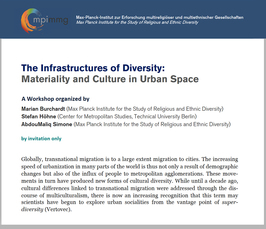"The Infrastructures of Diversity: Materiality and Culture in Urban Space"
Workshops, conferences 2015
- Start: Jul 9, 2015 02:00 PM (Local Time Germany)
- End: Jul 10, 2015 03:30 PM
- Location: MPI-MMG, Hermann-Föge-Weg 12, Göttingen
- Room: Conference Room

For more details please contact esser(at)mmg.mpg.de.
- by invitation only -
Globally, transnational migration is to a large extent migration to cities. The increasing speed of urbanization in many parts of the world is thus not only a result of demographic changes but also of the influx of people to metropolitan agglomerations. These movements in turn have produced new forms of cultural diversity. While until a decade ago, cultural differences linked to transnational migration were addressed through the discourse of multiculturalism, there is now an increasing recognition that this term may have become inadequate to capture the new social and cultural complexity of urban life-worlds. As migrants to cities are differentiated along multiple axis of difference, social scientists have begun to explore urban socialities from the vantage point of superdiversity (Vertovec).
In this context, scholarly work has focused on three key concerns: first, the ways in which diversity has been addressed in urban policy, emphasizing cities’ status as scalar formations with their own mechanisms of regulating and governing social life; second, the ways in which people experience, interpret, negotiate and grapple with diversity in everyday life and mundane interactions, i.e. through market sociability; and third, the ways in which diversity plays out in public space and challenges governance and power relations; this third body of literature addresses cultural questions regarding hegemonic
definitions of public space, political and administrative questions regarding access, use and legal entitlements to public space, as well as questions regarding the political economy of public space in neoliberalism, especially tendencies towards privatization. In all of this, there has been a move away from the studies of particular groups towards the study of relations and situated encounters in particular localities.